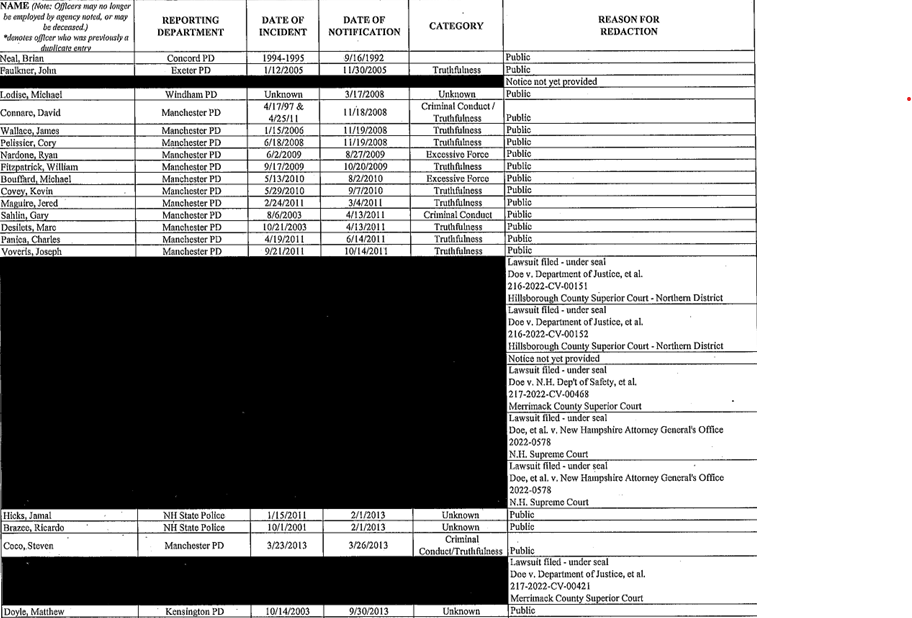The latest list of of police officer’s names on the Exculpatory Evidence Schedule, also called the Laurie List: https://www.doj.nh.gov/sites/g/files/ehbemt721/files/files/july-3-2024-ees-list.pdf
By DAMIEN FISHER, InDepthNH.org
Three years after a new law went into effect to make public the confidential names on the Exculpatory Evidence Schedule, also known as the Laurie List, four more names have been released.
The state has won 32 legal challenges to make public the names of individual officers since the EES inception in 2021, according to Brandon Chase, Assistant Attorney General with the Civil Litigation Unit.
“In short, there were 32 cases that were found in the DOJ’s favor on either a motion to dismiss or a motion for summary judgment. Eight cases were voluntarily non-suited by the Plaintiff,” Chase told InDepthNH.org.
The EES is the latest incarnation of the secret Laurie List, the catalog of police officers who were deemed by their chiefs to have credibility issues. Originally there were multiple lists kept by individual county attorneys and based on information provided by individual police chiefs.
The purpose was so prosecutors could notify defense attorneys when those Laurie Listed officers were part of a criminal case in court. Prosecutors are required to turn over all exculpatory evidence, that is evidence favorable to a defendant before trial.
That includes evidence in a police officer’s confidential disciplinary file that could be considered exculpatory evidence such as having been disciplined for dishonesty or excessive force.
The EES is now solely maintained by the New Hampshire Department of Justice.
A new law that was intended to make public the names of the police officers on the list in 2021 gave officers the right to challenge in Superior Court their placement before their names are published.
Three years later, at least 75 officers have filed lawsuits challenging their placements and dozens of these confidential lawsuits are still pending, and the names of the officers involved in the challenges are still secret. In fact, their lawsuits are filed under seal throughout the state’s judicial system.
Officers must first be formally notified of the EES placement and given time to challenge in court. However, there are cases when that notification is complicated such as deceased officers, officers serving overseas military deployments, or officers for whom there is no known contact information available, according to Senior Assistant Attorney General Myles Matteson, chief of the Criminal Justice Bureau.
“This Office is actively addressing these situations and because the total number is small, the Office declines to provide specific numbers as such information could be potentially identifying,” Matteson said.
Chase said his office does not keep track of how many hearings for EES lawsuits have so far been held in these cases. Some of the court cases are resolved through agreements.
According to the New Hampshire DOJ, 11 officers had their EES status remanded back to their original police departments.
Under that scenario, the current chief reviews the case and determines if the EES placement is warranted. Of those 11 cases, four of the officers have succeeded in overturning their EES status.
The July quarterly update to the public list of police officers with blemished records includes the public names of 218 officers, up from 214 in the April release. According to the New Hampshire Attorney General’s Office there are 270 officers in total on the list.
The new officers whose names were made public on the list are: Brentwood Police Officer Brett Wells, placed on the list for a 2018 incident categorized as “Criminal Conduct and Untruthfulness”; Hooksett Police Officer Meneide Schleiden, for an incident of “Criminal Conduct;” Conway Police Officer Dominic Torch, placed for “Truthfulness;” and Claremont Police Officer Casey Truesdell, placed for a 2019 incident of “Untruthfulness.”
The list does not give any context for the reasons individual officers make it on the list, and there are known cases in which officers are placed for bogus reasons.
At least one officer, Alexandra Drake, was put on the list in retaliation for reporting her superior’s sexual harassment while working for the New Boston Police. Drake was eventually paid $160,000 as part of her settlement with New Boston.





